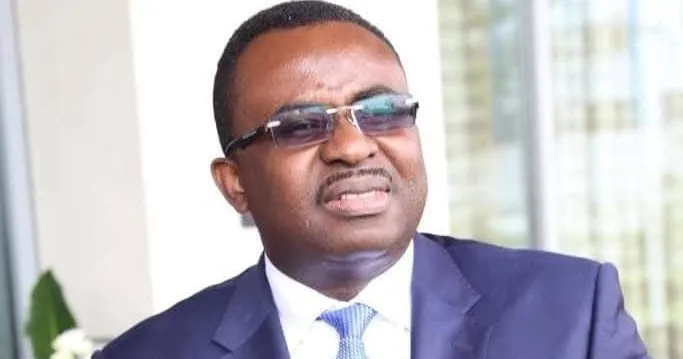For nearly eight years, the New Patriotic Party (NPP) government relentlessly pursued criminal charges against Dr Johnson Asiama, the former Deputy Governor of the Bank of Ghana (BoG).
Despite their efforts, they failed to secure a conviction. This failure was not due to political interference, as they now claim, but because the case against him was baseless from the very beginning.
The attempt to criminalize his actions was nothing more than a political witch hunt, and their inability to convict him exposes the fundamental weakness of their case.
Now, as President Mahama has appointed Dr Asiama as the acting Governor of the Bank of Ghana, the NPP’s fear and hypocrisy are on full display.
The NPP’s case against Dr Asiama was built on allegations of breach of the Bank of Ghana Act and causing financial loss to the state.
However, despite years of investigation and prosecution, the government could not produce any credible evidence to support these claims.
The liquidity support extended to Unibank and UT Bank, which formed the basis of the charges, followed established procedures, was based on technical recommendations, and was fully accounted for.
No financial loss was incurred, as confirmed by court records, banking reports, and independent investigations.
Even former Attorney General, Godfred Yeboah Dame, expressed doubts about the strength of the case, acknowledging the absence of cogent evidence and recommending that the charges be dropped. If the NPP’s own Attorney General could not justify the prosecution, it is clear that the entire case was politically motivated rather than legally sound.
One of the most glaring issues with the NPP’s prosecution of Dr Asiama was its selective nature.
Liquidity support for banks was not an isolated decision made by one individual but a policy directive executed by multiple high-ranking officials within the Bank of Ghana.
Yet, the NPP government chose to single out Dr Asiama, while other key players, including former Deputy Governors and even the current BoG Governor, were never charged despite approving similar liquidity support packages.
This selective prosecution undermines the credibility of the case and reveals the NPP’s political bias.
Even more damning is the fact that the NPP government itself continued to approve liquidity support for Unibank under administration.
If this was a crime, why did they allow the practice to continue under their own leadership? Their failure to prosecute other officials who engaged in the same acts further proves that the case against Dr Asiama was driven by political motives rather than legal merit.
In their desperate attempt to convict Dr Asiama, some individuals within the Bank of Ghana, resorted to falsifying official email correspondence to implicate him.
This criminal act was uncovered in court, exposing the extent to which certain elements within the BoG and NPP governments were willing to go to manufacture a case against him.
Instead of investigating those who committed this fraud, the NPP turned a blind eye, further proving that their goal was never justice but political persecution. Could it be that Dr. Gideon Boako, the NPP’s spokesperson, is afraid that his wife, who works at the Bank of Ghana, may lose her position?
Or is he worried that those within the Bank of Ghana who falsified evidence to implicate Dr Asiama will finally be exposed and held accountable?
These questions highlight the NPP’s fear of accountability and their attempts to distract from their own failures.
While the NPP wasted years chasing a phantom case against Dr Asiama, they ignored the real crisis within the Bank of Ghana. Under their leadership, the BoG incurred over GH₵73 billion in losses over the past eight years, excluding an additional over GH₵3 billion in 2024.
This financial mismanagement has plunged the bank into bankruptcy, forcing it to seek recapitalization from the government, which itself is relying on an IMF bailout.
Instead of focusing on solving Ghana’s economic crisis, the NPP was more interested in using the legal system to settle political scores.
The IMF and international financial institutions are not worried about Dr. Asiama’s appointment; they are concerned about the reckless economic policies that led Ghana into this crisis.
Dr Gideon Boako, as the Economic Advisor to the Head of the Economic Management Team, Dr Bawumia, was directly involved in these failures. His sudden outcry about governance and accountability now rings hollow.
The Attorney General has the constitutional discretion to determine whether a case has merit and is worth pursuing.
After reviewing the evidence, including the internal memo from former AG Godfred Dame, the current Attorney General made the justifiable decision to discontinue the prosecution.
This decision was based on the facts, the lack of evidence, and the need to prevent further abuse of the legal system for political purposes.
The reality is that the NPP had eight years to prove its case and failed. Their continued attacks on Dr. Asiama, even after the charges have been dropped, only expose their frustration at losing a political weapon.
If they had real evidence, they would have secured a conviction long ago. Their failure to do so is proof that the case was never about justice; it was always about persecution.
The NPP’s inability to convict Dr Asiama after eight years of relentless pursuit confirms what many have known all along: the charges were politically motivated and lacked any legal merit.
The decision to withdraw the case was not an act of favoritism but a recognition of the truth—that Dr Asiama was unfairly targeted for simply doing his job.
Ghana must move past these divisive tactics and focus on economic recovery. It is time to let Dr Asiama serve his country without the shadow of political persecution hanging over him.
The NPP’s fear of his appointment is not rooted in concerns about governance or accountability but in their own guilt and fear of being exposed for their failures and misconduct.
